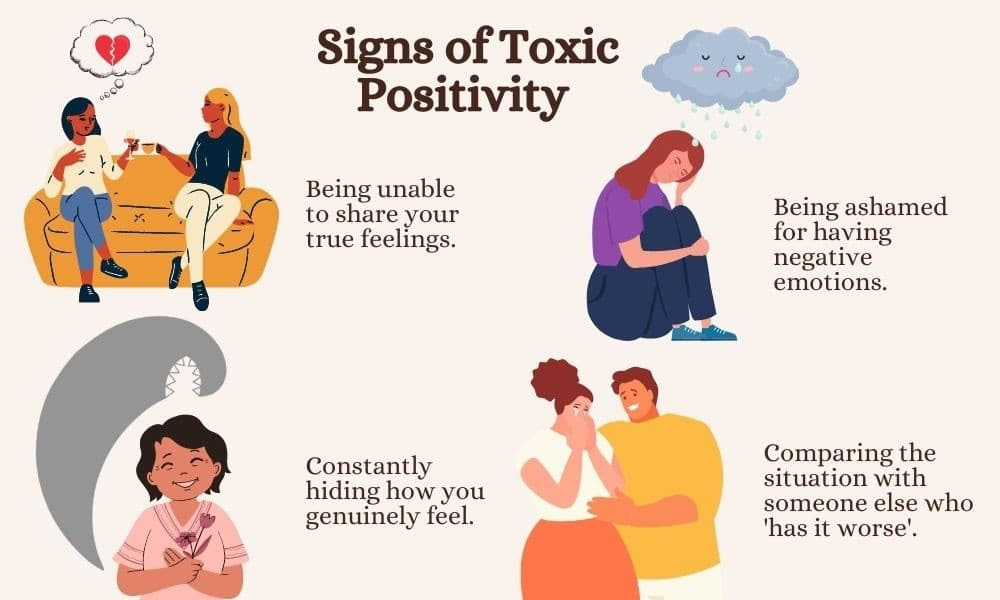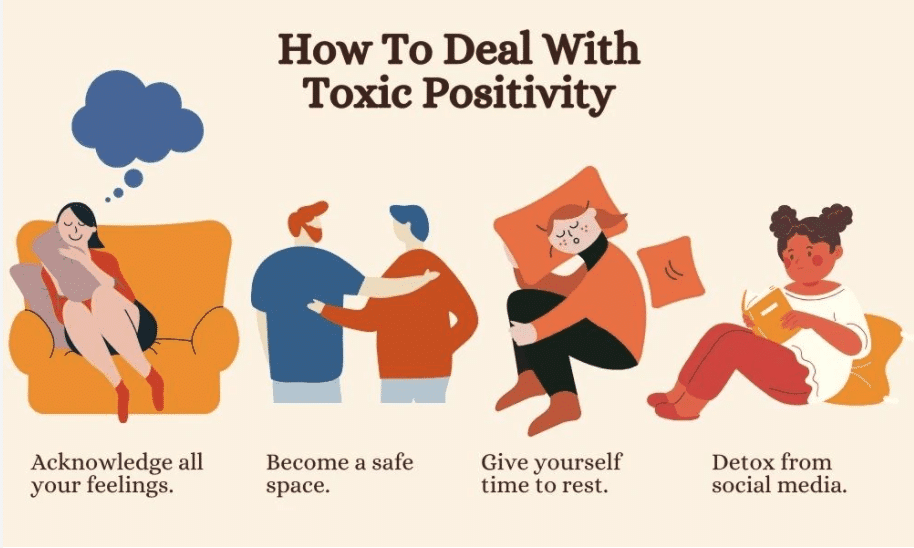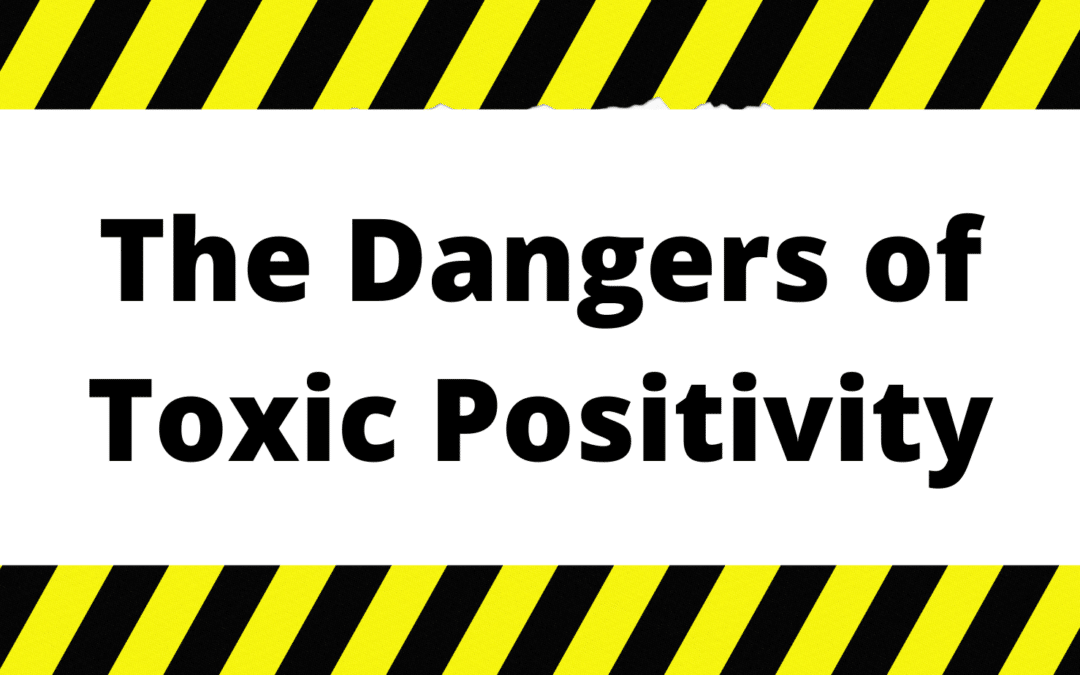From “think positive” to “no bad days,” the internet is full of uplifting quotes and phrases that are meant to inspire positivity in a helpful way. These words might be comforting, but they also highlight an aspect of U.S. culture that can be more harmful than helpful: toxic positivity.
We all know that having a positive outlook on life is good for your mental well-being. The problem is that life isn’t always positive. We all deal with painful emotions and experiences. Those emotions, while often unpleasant, are important and need to be felt and dealt with openly and honestly.
What is toxic positivity?

Toxic positivity involves dismissing negative emotions and responding to distress with false reassurances rather than empathy. It comes from feeling uncomfortable with negative emotions. It is often well-intentioned but can cause alienation and a feeling of disconnection.
Toxic positivity is shallow. It’s a false reassurance, like someone saying “everything happens for a reason” after your grandmother dies or “everything will work out” after you lose your job and apartment and are forced to relocate.
Toxic positivity takes positive thinking to an overgeneralized extreme. This attitude doesn’t just stress the importance of optimism, it minimizes and denies any trace of human emotions that aren’t strictly happy or positive.
Toxic positivity can take a wide variety of forms. Some examples you may have encountered in your own life:
- When something bad happens, such as losing your job, people tell you to “just stay positive” or “look on the bright side.” While such comments are often meant to be sympathetic, they can also be a way of shutting down anything you might want to say about what you are experiencing.
- After experiencing some type of loss, people tell you that “everything happens for a reason.” While people often make such statements because they believe they are comforting, it is also a way of avoiding someone else’s pain.
- When you express disappointment or sadness, someone tells you that “happiness is a choice.” This suggests that if you are feeling negative emotions, then it’s your own fault for not “choosing” to be happy.
Sometimes, forcing positivity may not be in response to someone else’s misfortune but our own. It’s normal and understandable to not want to deal with your negative emotions sometimes. But if you’re regularly forcing a positive outlook on yourself when your feelings are the opposite, it can take a toll on your mental health.

Toxic positivity can actually harm people who are going through difficult times. Rather than being able to share genuine human emotions and gain unconditional support, people find their feelings dismissed, ignored, or outright invalidated.
- It’s shaming: When someone is suffering, they need to know that their emotions are valid, but that they can find relief and love in their friends and family. Toxic positivity tells people that the emotions they are feeling are unacceptable.
- It causes guilt: It sends a message that if you aren’t finding a way to feel positive, even in the face of tragedy, that you are doing something wrong.
- It avoids authentic human emotion: Toxic positivity functions as an avoidance mechanism. When other people engage in this type of behavior, it allows them to sidestep emotional situations that might make them feel uncomfortable. But sometimes we turn these same ideas on ourselves, internalizing these toxic ideas. When we feel difficult emotions, we then discount, dismiss, and deny them.
- It prevents growth: It allows us to avoid feeling things that might be painful, but it also denies us the ability to face challenging feelings that can ultimately lead to growth and deeper insight.
The “positive vibes only” mantra can be particularly grating during times of intense personal distress. When people are coping with situations such as financial troubles, job loss, illness, or the loss of a loved one, being told that they need to look on the bright side can seem downright cruel. It is possible to be optimistic in the face of difficult experiences and challenges. But people going through trauma don’t need to be told to stay positive or feel that they are being judged for not maintaining a sunny outlook.
How to Avoid Toxic Positivity
If you’ve been affected by toxic positivity—or if you recognize this kind of behavior in yourself— there are things that you can do to develop a healthier, more supportive approach. Some ideas include:
- Manage your negative emotions, but don’t deny them. Negative emotions can cause stress when unchecked,1 but they can also provide important information that can lead to beneficial changes in your life.
- Be realistic about what you should feel. When you are facing a stressful situation, it’s normal to feel stressed, worried, or even fearful. Don’t expect too much from yourself. Focus on self-care and taking steps that can help improve your situation.
- It’s okay to feel more than one thing. If you are facing a challenge, it’s possible to feel nervous about the future and also hopeful that you will succeed. Your emotions are as complex as the situation itself.
- Focus on listening to others and showing support. When someone expresses a difficult emotion, don’t shut them down with toxic platitudes. Instead, let them know that what they are feeling is normal and that you are there to listen.
Notice how you feel. Following “positive” social media accounts can sometimes serve as a source of inspiration, but pay attention to how you feel after you view and interact with such content. If you are left with a sense of shame or guilt after seeing “uplifting” posts, it might be due to toxic positivity. In such cases, consider limiting your social media consumption.

Toxic positivity is often subtle, and we’ve all engaged in this type of thinking at one point or another. By learning to recognize it, however, you’ll be better able to rid yourself of this type of thinking and provide (and receive) more authentic support when you are going through something that isn’t easy.
Start noticing toxic statements and strive to let yourself and others feel your emotions, both the positive and the negative.

